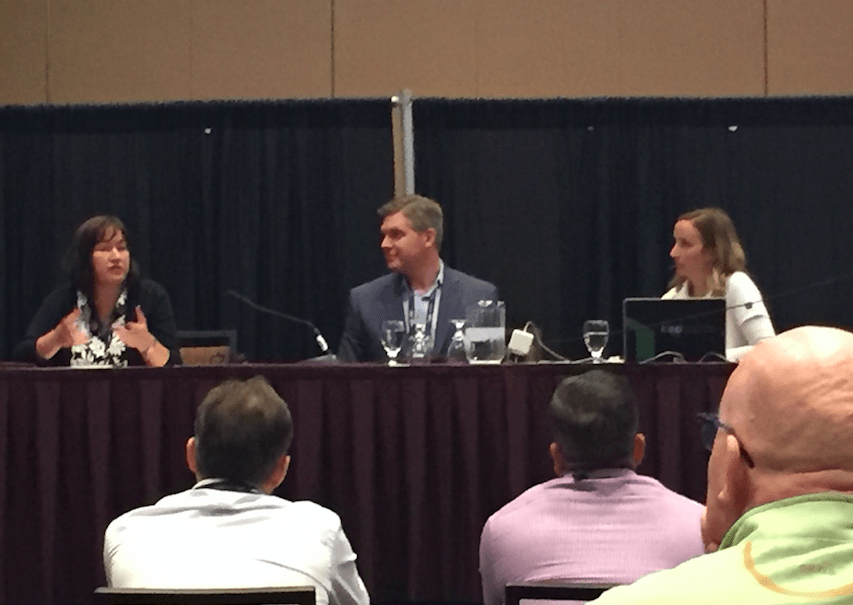
They say ‘What happens in Vegas, stays in Vegas’, but in this case Artificial Lawyer’s great Guest Bloggers at ILTACon 2017 have shown that isn’t always so.
Guest Bloggers, Alicia Ryan, who is a Knowledge Management Attorney at US law firm Fenwick & West; and Matthew Golab, who is legal Informatics Manager at Australian law firm Gilbert + Tobin, report here on what went down at some of the key sessions in Vegas at what is the biggest gathering of legal tech fans in America.
First, we hear from Alicia, about her Day One at the conference and also some of the key points from the Kira Systems legal AI panel, which she took part in.
Happy Accidents at ILTACon 2017

Greetings Artificial Lawyers, from sweltering Las Vegas!
This is a guest post with a twist. As a Knowledge Management Attorney at a tech-focused law firm, I was especially keen to hear about the ‘Myths, Realities, and Future’ of AI at today’s opening panel – the first of three on the topic of AI over the course of this week-long conference.
However, the myth turned out to be that they had booked a sufficiently large room for everyone interested in legal AI, while the reality was that the room was jammed and your intrepid guest blogger, along with many other hopefuls, was shut out.
That the AI panel drew a capacity-plus crowd is perhaps good evidence of the level of interest in this technology in the legal space. I can attest to that at my own firm: people want to ‘try AI.’ (And, at Fenwick, we are, via an ongoing implementation of Kira Systems’ platform for M&A due diligence – more on that below.)
Having been shut out of the AI session, I wandered (somewhat long-faced, I assure you) into the nominee presentations for the ‘Most Innovative Law Firm’ award.
And here’s where the twist comes in: though I stumbled in looking dejected, hang-dog, and probably slightly confused, I left inspired. These firms (Baker Donelson, Littler, and Seyfarth Shaw) are doing innovation! Some of it is even AI! (Seyfarth is on the leading edge of chatbots and software robots.)

But it was Littler’s, seemingly low-tech, ‘Knowledge Desk’ that I found most interesting because it answers a question I have been wrestling with recently: How do we help users who will never be ‘self-service’; those who will never try any self-service tool or who will give up in (often silent) frustration at the first obstacle?
Essentially, the ‘Knowledge Desk’ approach is a concierge service staffed, in Littler’s case, by library assistants who answer all legal, technical, and administrative questions that get put to them. If they can’t answer a question directly, it gets referred to the appropriate IT/Library/KM staff member. But the person staffed on the desk is able to answer questions 80% of the time, escalating only 20% of questions.
How do they do it? Here’s the tech part. (You were wondering when I was going to get to that, right?) They use all the same self-service tools available to other users.
This is why this concept appeals to me: it is a way to re-purposed all the tools we (in KM, IT, Library, etc) have already bought or built (think dashboards, chatbots, portals) in a way that makes them accessible to users who aren’t comfortable in a self-service environment. With minimal additional staff and resources required.
Not to mention, it could help move technology detractors down the path to becoming fans. I’m all for more fans.
Plus, it was a nice reminder, as we move toward the bright AI-, blockchain-enabled future of law, that we should endeavour to “leave no man behind.”
Eight Ways to Succeed at AI
(This segment is distilled from the talk Alicia gave at the Kira Systems panel on ‘Driving Adoption of Machine Learning Contract Review’)
Here are eight key steps you’ll need to consider if you want your AI adoption to go well:
- Get an enthusiastic partner evangelist.
- If you haven’t done step 1, go back to start.
- Designate a user to be the project lead – to answer questions and manage/measure user adoption.
- Have regular user meetings with active user participation part of the agenda.
- Adopt a mantra in your messaging that use of the tool is now the ordinary course way we do it here at Firm X.
- Tailor your messaging to your audience:

-associates: AI will make your life easier, not take your job
-partners: this tool will benefit clients and help us win/keep work
-clients: we can give you better /faster / cheaper options and more of them
- Involve players early and often. (Partners, Associates, Risk, KM, Budgeting, Pricing)
- Be high touch and proactive with support. Don’t assume you can give busy users a new tool, even a compelling one, and they will learn and use it without any encouragement or support. If the project is important to the firm, treat your users accordingly.
And now, Matt Golab tells readers about his experience of travelling from Australia to ILTACon and some of what he has seen so far.
From Australia to Vegas

ILTACON is a large conference with thousands of attendees. For an Australian, with the somewhat daunting 15+ flight time, it’s also quite a large commitment to flying and travel.
Not only is the conference large in attendees, it’s also geographically large, and it spans three floors of conference space at the Mandalay Bay resort. There is a lot of walking involved while attending, as you find that each session is invariably held on different floors and so you do a lot of scurrying between floors.
I walked slightly over 8km today, so it is a relief at the end of each day to put your feet up, although there are also a variety of vendor hosted events each evening which give you ample opportunity to partake in refreshments to take your mind off your feet!
One of the terrific features of the conference is the ILTACon app, as this gives you the ability to have a live schedule with you of each session (with reminders) as well as the ability to see where the session is on a map, as well as many other cool features such as providing you with the slides that you can download during the session.

In 2015 I was an inaugural winner of the Browning Marean scholarship (International) to attend ILTACON, and it is fascinating to be back two years later.
After Day One, my gut feeling is that there has been a lot of work in the legal AI field and it now appears that it’s quite accepted and somewhat ‘a normal part of life’ in 2017, whereas back in 2015 the sense I got from ILTACON was that AI was the hot topic.
After the keynote session, there were two legal AI sessions, The Myths, Realities and Future of AI and Automation in the Law was one (see here for an audio recording).
I joined the second legal AI session that was running concurrently – Thomson Reuters Thought Leadership Series: AI in Practice.
This session was co-presented by David Curle (Thomson Reuters); Christian Mammen (Partner, Hogan Lovells) and Jeffrey Sharer (Partner, Akerman LLP).
The main topics of discussion were legal and ethical considerations on the use of cognitive technology, and included:
- unathorised practice of law
- duty of confidentiality
- attorney/client privilege and work product
- duty of competence
- duty of diligence
With predictive coding (TAR) in eDiscovery, the main point raised was on transparency: do the lawyers understand how the system works, and can you ethically use something if you don’t understand how it works?
The ABA Model Rule 1.1, Comment 8 states ‘a lawyer should keep abreast of changes in the law and its practice, including the benefits and risks associated with relevant technology’.

Another session in the afternoon had Judge Peck, among other luminaries, talking about TAR and eDiscovery, and one of Judge Peck’s comments was that he was disappointed in the progress of TAR adoption. However he was pleased that when it was adopted by parties it was largely adopted without arguments, which I think is another example of the acceptance of legal AI technology.
Very much looking forward to tomorrow’s sessions!
[Pictures in main article of Las Vegas/ILTACon, courtesy of Matt Golab, except Kira Panel, which is by Alicia Ryan.]
1 Trackback / Pingback
Comments are closed.